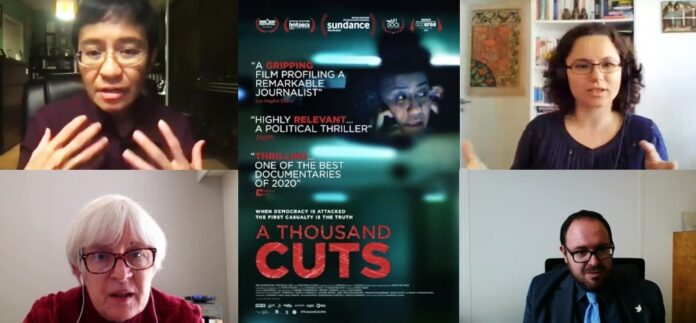“An atom bomb has exploded in our information ecosystem,” according to Maria Ressa, CEO of Rappler, the leading digital media company in the Philippines. Ms Ressa added that “disinformation is the new terrorism” warning against the dangers it poses to democracy across the world.

Press freedom and the online abuse of female journalists was at the heart of the latest Cine-ONU screening and the ensuing panel discussion with experts from the European Commission and UNESCO. ‘A Thousand Cuts’ documents the escalating war between President Duterte’s Government and the independent press in the Philippines. We follow Maria Ressa and her team as they are subject to abuse, threats, and legal battles in their search for truth.
“Disinformation is the new terrorism”
“In the Philippines, journalists have been jailed and killed. Media networks have been shut down. The level of violence has escalated. Human rights activists have been targeted,” Maria Ressa told the audience, adding that this phenomenon is not restricted to the Philippines. “What happens in Silicon Valley impacts the global south. This is where disinformation reeks the most havoc. What is global is local and what is local is global.”
In the Philippines the use of bots and troll accounts is widespread. They are at the centre of the spread of misinformation and what Ms Ressa calls a “virus of lies”. Just 25 accounts have the potential to influence 3 million people with the right message.

“The delivery platform for our news is biased against facts. Disinformation is the new terrorism. The business model for social media platforms does not contribute to democracy. Ironically, social media is rolling back democracy,” according to Ms Ressa.
The quest for a transparent and just social media environment is at the heart of UNESCO’s ‘Social Media 4 Peace’ (SM4P) campaign. “UNESCO is creating a global dialogue on disinformation; we are empowering fact checking networks all over the world. We have to identify our allies and see how we can help them,” Guilherme Canela De Souza Godoi – Chief of UNESCO Freedom of Expression and Safety of Journalists Section, said.
The challenge ahead for freedom of the press
Both panellists and audience members commended Maria for her bravery in the face of such a hostile and dangerous media environment. “We consider journalists as human rights defenders. Outside the European Union, EU diplomats in delegations on the ground are the safety link for journalists,” Laura Bretea, Democratic Governance Policy Officer at the European Commission, explained. Ms Bretea leads the Media4Democracy project which supports EU Delegations in the implementation of the EU Human Rights Guidelines on Freedom of Expression online and offline.

When asked what motivates her to carry on resisting, Maria Ressa replied, “I have no choice. The baton was passed on to me at a time when I could not drop it – and I have a fantastic team which knows what these times demand. I embrace my fear and know that what I, and other journalists do, will help determine the future of our democracy.”
Ms Ressa ended the discussion with a message to colleagues and audience members across the globe, “The UN system must hold the line, but it is a challenge to retain our humanity when the world is pushing violence and fear. News used to be delivered and received in a public square, but now we are alone, isolated and fearful.”
At the end of the film Maria Ressa quotes Martin Niemoller’s poem:
“First, they came for the socialists, and I did not speak out. Because I was not a socialist.
Then they came for the trade unionists, and I did not speak out. Because I was not a trade unionist.
Then they came for the Jews, and I did not speak out. Because I was not a Jew.
Then they came for me. And there was no one left to speak for me.”
Maria proposed an addition to the poem:
“Then they came for the journalists. We don’t know what happened after that”.


